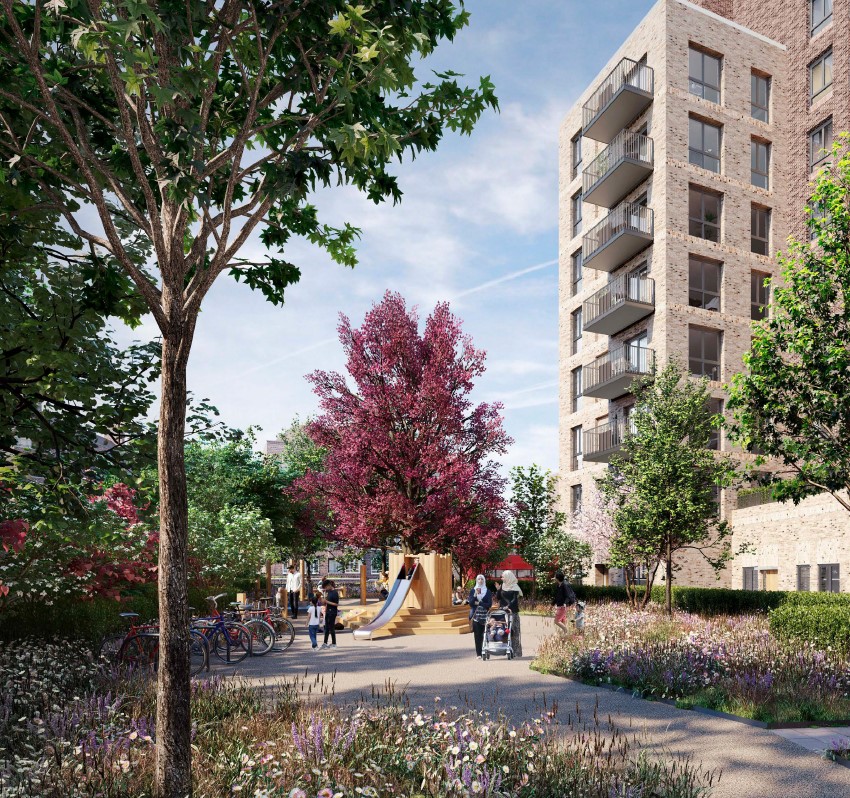Project Overview
Temple undertook an Environmental Impact assessment to support a detailed planning application for Phase 4 of one of Europe’s largest single site estate regeneration projects. Phase 4 is located on an approximately 1.4 hectare site and the Proposed Development comprises 511 homes, ranging from 1-26 stories in height and commercial or community floorspace.
What was our approach?
The adjacent Seven Sisters Road has high noise levels. This prevented overheating from being mitigated through open windows in line with Approved Document O. Our noise and vibration technical specialists worked closely with the appointed overheating consultants. Together, they modelled various design iterations to ensure acceptable noise and temperature conditions within homes, without introducing excessive energy usage, by providing a solution (peak lopping) only to those facades that required it.
Furthermore, the local reservoir and nature reserve (Woodberry Wetlands) contains a population of wintering birds, which are functionally connected to the nearby Lee Valley SPA/Ramsar Site. The Proposed Development had the potential to impact the reservoir, as the reservoir is located less than 100m from the Phase 4 Site. The wintering birds travelling from Lee Valley SPA/Ramsar were considered closely by our ecologist specialists, to evaluate the impacts on designated habitats. They were detailed in a Habitat Regulations Screening Report.
Emerging case law at the end period of the Environmental Statement preparation led to last-minute changes to the planning status of committed developments that should be included within cumulative effects assessments. We worked closely with the project’s legal advisors to resolve the issue. After the initial issue of understanding the case law was complete, the Temple team ensured that all specialists were aware of the implications for their cumulative assessments.
As part of the longer-term estate regeneration project, it was important to ensure that the local community could engage with the Environmental Impact Assessment process. Engaging the public in the EIA process requires a thorough methodology to gather opinions and to include these within the project. We presented our findings to the Woodberry Down Community Organisation, and we ensured that the Non-Technical Summary was as clear, concise and accessible as possible, using non-technical language, clear diagrams with alt text on images, in line with the at the time emerging IEMA Guidance on Non-Technical Summaries. Additional printed copies of the ES were provided so they could be made available at the local library as well as the council offices.
Iterations to the proposed development were then made, with a first round of changes in light of additional comments from the London Borough of Hackney, and a second round of changes to accommodate second staircases in line with newly introduced Greater London Authority requirements. Once amendments to the scheme were finalised, Temple effectively communicated the changes necessary to topic specialists and ensured they were aware of the changing project details so the assessed scheme could reflect the project as set out in the planning application.
The Proposed Development targeted a biodiversity net gain of 10%, which was challenging due to the relatively small and constrained site. To increase the biodiversity value of the proposed planting, Temple’s ecology team closely collaborated with the landscape consultants and architects to maximise the biodiversity value of the planting scheme to reach a net gain of 13.74%.
Conclusion
Our work ensured the correct resources were dedicated to the technical specialists during a time of evolving guidance. As a result, chapters were produced to adhere to new legislation and case law with optimal resources at the detailed stage of planning.

